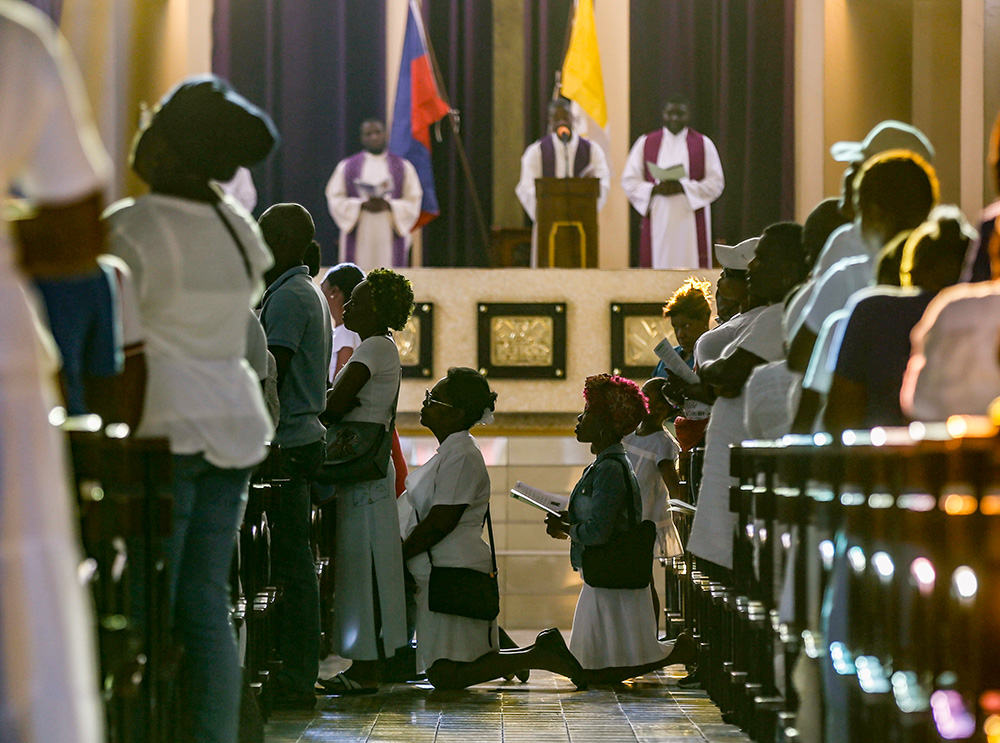Joaquim Magalhães de Castro
One year after the installation of the Presidential Transitional Council (CTP), Father Marc-Henry Siméon, spokesperson for the Haitian Episcopal Conference, makes a rather somber assessment of the ‘achievements’ of this body, which was supposed to free the country from the insecurity caused by the criminal gangs that have plagued the country for decades. “The state is progressively collapsing, leaving the door open to armed gangs that are expanding their area of control, especially in the capital,” he says.
In a recent televised debate broadcast by Radio Télé Métropole, and regarding the murder of the nuns Evanette Onezaire and Jeanne Voltaire, of the Little Sisters of Saint Therese of the Child Jesus, which occurred on March 31 in the commune of Mirebalais, about fifty kilometers northeast of the capital, Father Simeaon recalled the “martyr character of the Haitian people” and reminded them that the Catholic Church will always be in communion with these people, sharing with them “their collective suffering”. Security conditions in Mirebalais are so precarious that it has not yet been possible to recover the bodies of the two nuns to provide them with proper funeral services.
Faced with what he calls “collective failure”, Father Siméon calls for a “moral revolution rather than a brutal revolt.” It also calls on political leaders to engage in sincere introspection and open themselves “to an inclusive dialogue” to find a credible solution to the crisis. “Those who have failed in their humanity will never give up power alone,” he concludes.
According to the UN, there are more than a million displaced people in Haiti, a number that has tripled in the space of a year. Gang violence in the capital Port-au-Prince has forced thousands of families to flee on several occasions. According to the United Nations, in the first three months of the year, at least 1,518 people died and 572 were injured due to violence from gangs, self-defense militias and police operations.
Despite such a hostile panorama, the population tries to lead a normal life. Every morning, for example, around 250 children brave steep and dangerous paths for hours to reach Pourcine Pic Makaya primary school. They come from villages scattered throughout the region: some come up from nearby valleys; others descend from the top of the plateau, facing stony and slippery trails, which, with rain or even dew, become almost impassable. One of the missionaries present in the community says that every morning, he waits at the entrance to the schoolyard for the arrival of their young heroes, aged between 4 and 14. Many arrive well dressed, “within their means”, in their school uniforms. Even the little ones, “who travel long distances”, take care to wash themselves in the public tank before leaving home. “Punctuality, however, is not always possible,” confesses the religious man.
Getting sick at Pourcine Pic Makaya is a misfortune that must be avoided at all costs. The poorly equipped local hospital is far away and is reserved for the most serious cases. They are transported there – once they have crossed a deep valley: a six-hour walk – first by hand, on a stretcher, and then by motorbike, or, with luck, inside one of the rare motorized vehicles that rarely passes by.
Illnesses, especially less serious ones, are treated using traditional medicine, which combines the use of medicinal plants with rituals that are difficult for more rational spirits to understand. In many cases, the method is effective and decisive; However, there are situations that, due to their severity, require immediate treatment and the presence of qualified personnel. In these cases, insisting on traditional medicines can have fatal consequences. In recent months, several people have died because of these ‘traditional beliefs’.
In Pourcine Pic Makaya, the parish priest’s house has therefore become a point of reference for all those who fall ill, whether it be a simple toothache, bronchitis or a minor wound… Not to mention the school-age children who arrive there with parasites, fever, cough, minor injuries, etc.
For now, the volunteer representatives of the Church of Christ are monitoring symptoms and helping people cross the deep valley, where, with luck, they can reach the hospital. “I am always amazed,” says our anonymous missionary, “at how people in poor health can make such an arduous and difficult journey.” They arrive at the parish burning with fever or seriously injured and still find the strength to get to the hospital. “This is, without a doubt, a people of heroes,” concludes the missionary.
In 2024 and in the first half of 2025, some measures were taken to improve the living conditions of the local community. In the remaining months of the year this path will continue, despite the enormous difficulties that the country faces. Adult literacy projects will soon begin, as well as maintenance work on some sections of the trails and mule tracks in the region, work on the “second section of the aqueduct” and the safety of two other sources, as well as maintenance of the coffee nursery. However, the biggest challenge remains to be met: the construction of a small clinic that meets the increasingly pressing health needs of the population.


 Follow
Follow


